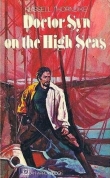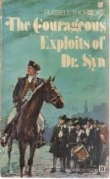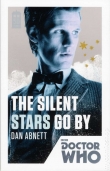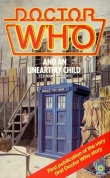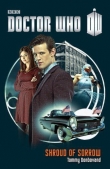
Текст книги "Doctor Who- Beautiful Chaos"
Автор книги: Gary Russell
Жанры:
Классическое фэнтези
,сообщить о нарушении
Текущая страница: 1 (всего у книги 12 страниц)



Beautiful
Chaos
GARY RUSSELL
2 4 6 8 10 9 7 5 3 1
Published in 2008 by BBC Books, an imprint of Ebury Publishing.
Ebury Publishing is a division of the Random House Group Ltd.
© Gary Russell, 2008
Gary Russell has asserted his right to be identified as the author of this Work in accordance with the Copyright, Design and Patents Act 1988.
Doctor Who is a BBC Wales production for BBC One Executive Producers: Russell T Davies and Julie Gardner
Original series broadcast on BBC Television. Format © BBC 1963.
‘Doctor Who’, ‘TARDIS’ and the Doctor Who logo are trademarks of the British Broadcasting Corporation and are used under licence. Mandragora Helix created by Louis Marks.
All rights reserved. No part of this publication may be reproduced, stored in a retrieval system, or transmitted in any form or by any means, electronic, mechanical, photocopying, recording or otherwise, without the prior permission of the copyright owner.
The Random House Group Ltd Reg. No. 954009.
Addresses for companies within the Random House Group can be found at www.randomhouse.co.uk.
A CIP catalogue record for this book is available from the British Library.
ISBN 978 1 846 07563 6
The Random House Group Limited supports the Forest Stewardship Council (FSC), the leading international forest certification organisation. All our titles that are printed on Greenpeace approved FSC certified paper carry the FSC logo. Our paper procurement policy can be found at www.rbooks.co.uk/environment
Series Consultant: Justin Richards Project Editor: Steve Tribe
Cover design by Lee Binding © BBC 2008
Typeset in Albertina and Deviant Strain Printed and bound in Germany by GGP Media GmbH
For Russell and Julie,
for letting me play in the sandbox…
Recent titles in the Doctor Who series: MARTHA IN THE MIRROR
Justin Richards
SNOW GLOBE 7
Mike Tucker
THE MANY HANDS
Dale Smith
GHOSTS OF INDIA
Mark Morris
THE DOCTOR TRAP
Simon Messingham
SHINING DARKNESS
Mark Michalowski
THE STORY OF MARTHA
Dan Abnett
THE EYELESS
Lance Parkin
ONE DAY …
It was raining up on the hill, the steady patter-patter-patter hitting the vast golfing umbrella like bullets on tin. Truth be told, it was raining everywhere, but up on the hill, here in the allotment, that was the only place Wilfred Mott really cared about it raining right now.
Whenever it rained, he couldn’t help but remember.
That awful, awful day when he had come to the house, bringing Donna with him. Unconscious, unable to remember anything. For her own safety.
Wilf remembered that final sight of the Doctor, soaked in the rain, his face streaked with water, hair drooping, clothes clinging tight to his skinny body. And his eyes, his eyes looked so haunted, so sad, so lost. So, so old. They looked like the eyes of an old man, trapped in a ridiculously young body. So miserable. So alone. So lonely.
Then that marvellous blue box had vanished as Wilf saluted it.
And he’d never seen the Doctor again.
But that didn’t stop him looking, up there. Up into the night sky, up into the stars that were only still there because of Donna. Up at the stars that warmed and illuminated countless planets, with countless lives that owed their continued existence to Donna Noble. Who would never know – who could never know. Because if she did…
He didn’t want to think about that. He didn’t entirely
understand it; he just trusted the Doctor. With his life. And the Doctor deserved that trust because he had saved them all.
From the spaceships in the sky, from the Christmas star, from that huge great Titanic, from the Adipose, the Sontarans and the Daleks.
And those were just the ones he knew about. He knew from Donna, Donna as she had been before, that there were countless more.
He shook his head at the scale of it all. And how small and insignificant he was in comparison. But he didn’t really mind about that. Because the honour had been in knowing the Doctor.
He reached into a damp pocket and pulled out an old leather wallet. And from inside that, he pulled out some photographs.
One showed Donna on her wedding day, the wedding that had never happened. Donna believed she had never even made it to the altar because poor Lance had got caught up in that business with the Christmas Star attacking the streets of London. Lance had died then – that was the story he’d told her. Indeed, it was the story Wilf told everyone. And he also told Donna that she had been so traumatised by Lance’s death, that she’d gone to Egypt to get over the shock.
Whatever it was that the Doctor had done to her memories made her brain accept the story and find a way to fit it together so she was convinced that was indeed what had happened. Perhaps that was the one good thing that had come out of the ‘accident’ – her brain did that to
cope so, rather than a year or so of blankness, if you put an idea to her, she was able to rationalise it without question. Like a jigsaw where any pieces that didn’t fit just reshaped their edges to make sure they did, and formed a slightly different picture but one Donna would never query.
Another picture was of Donna with her mum and dad at her dad’s birthday dinner in town. His last birthday as it turned out.
The final photo was of an older woman in a wicker chair, glass of stout in hand, toasting the photographer.
He sighed. So much sadness in the Noble house over the last couple of years.
He put the photos away and took another look through his telescope.
Nothing to see.
‘How’s the night sky?’ asked a voice from behind.
‘Hullo, sweetheart,’ Wilf said, indicating the newcomer should join him under the umbrella. ‘What are you doing here? You’ll catch your death.’
‘Oh, I’m all right, Dad,’ said Sylvia Noble, passing a thermos flask to him. ‘Brought you some tea and a bar of chocolate.’
Wilf gratefully took the flask, and they sat in silence for a while, letting the rain create a symphony above them. Then he unscrewed the thermos and offered it to his daughter. She shook her head.
‘Donna used to do this,’ he muttered.
Sylvia nodded. ‘I know. Maybe I need to jog her memory, and she’ll start again.’
Wilf shrugged sadly. ‘Best not to, eh? Just in case.’
Sylvia changed the subject. ‘No blue boxes in the sky tonight then?’
‘Not today. But one day I’ll see him.’
There was a pause. ‘Does it really matter? After all he did to us?’
‘Yes, love, it does,’ Wilf said. ‘I need to know he’s out there, still watching over us. Watching over the universe.
Because then I know that what Donna has suffered was worth it. Because without him, we’re not safe.’
‘That’s a lot of faith to put in one man, Dad,’ Sylvia said quietly. ‘And a lot of responsibility.’
Wilf knew that Sylvia didn’t like the Doctor, and not just because of what had happened to Donna. She felt that if the Doctor had never come to Earth maybe those Dalek things wouldn’t have either. It was an old argument, and the two of them would never agree about it. As a result, they tried not to talk about the Doctor too often.
‘He’s out there, love. Protecting us. And the Martians.
And the Venusians. And God knows who else.’ He took a swig of tea. ‘You should probably get back in the warm, shouldn’t you?’
Sylvia nodded and stood up. ‘You going to be much longer?’
‘Nah, just want to stay here till eleven, then I’ll head back.’
‘Donna suggested a drive out to Netty’s tomorrow.’
Wilf put his tea down. ‘No thanks,’ he said quickly.
‘Dad, you have to see her some time.’ Sylvia reached out and squeezed his hand. ‘For your sake if not hers.’
‘You shouldn’t let Donna go,’ Wilf said. ‘It’s not safe.
What if she says something about the Doctor?’
‘That’s not likely. Even if she does, Donna won’t understand and Netty won’t be able to explain it.’ Sylvia stood up and walked back into the rain. Then she looked back at her old dad. ‘We’ve gone through more heartache than anyone should have to, Dad,’ she said quietly. ‘Let’s not bring any more on ourselves. Please come.’
‘I’ll think about it. Now go on, before you get a cold.’
Sylvia pointed up to the sky. ‘The Doctor would want you to,’ she said.
Wilf turned to her with a frown. ‘That’s beneath you, sweetheart. Please don’t.’
Sylvia nodded. ‘I’m sorry, Dad.’ And she walked back out of the allotments and down the hill.
Wilf watched her receding form until she was out of his view, then unwrapped his chocolate and bit a chunk out of it. He turned for another look through the telescope, cross because Sylvia had invoked the Doctor. Cross because it was a cheap shot. And cross because Sylvia was dead right.
A tear rolled down Wilf’s worn cheek.
For so many reasons.
One month after the skies had burned…
FRIDAY
Terry Lockworth checked his mobile, but there was still no signal. Maria was going to be so fed up with him –he’d had to work late but couldn’t let her know. No doubt the spag bol would be in the bin tonight. Again. Poor Maria – it wasn’t her fault she got fed up with him, but what was he supposed to do. They’d been married three months, had a child on the way (please let it be a girl), and money was tight.
Sure, her dad had given them a deposit for the flat in Boston Manor, but there was still the mortgage, the bills, pre-natal classes, food…
Terry shook his head as he pocketed the phone. Stop moaning, he told himself, and get on with the job, then he’d be home in an hour with any luck. More importantly, he’d be out of this mobile phone black spot in half that, so he could at least phone her then.
He picked up his toolbox and took out the wire-cutters,
clipped the plastic coating from the copper wiring and cut the wires. He then yanked the old cables from the junction box and pulled a long thin coil of fibre optics out of the toolbox. These were interesting fibre optics (well, OK, only Terry found them interesting) because they were even finer than normal. A new system, developed by the Americans (aren’t they always), and this building was the first in the UK to utilise them. They’d sent Terry on a course in New York six months back to learn about the system. That’d been fun – lots of nights on the town with Johnnie Bates, discovering that it really was the city that never slept. Frequently they’d only just made it to the training classes the next day, hung over but happy.
Terry was sensible enough to know when to party and when to really knuckle down and get the job done, though, and he and Johnnie had come back to England, certified to work on installing these new fibre optics, which made them both popular with their boss and earned them a bit of a bonus.
They’d been promised another bonus if they got this job done and, frankly, it was money in the bank the way they were going. The cabling was easy, it was the removal of the old copper stuff that was taking the time.
Johnnie was a couple of floors above him, closer to the demonstration suite. They’d flipped a coin to see who hung around with the bigwigs and had the chance to nick a cup of tea off the secretaries and PAs and who got the back stairways and service corridors. Terry had lost, of course. No tea for him.
He pulled a screwdriver out of his tool belt and started
to open the last junction box, whistling something he’d heard on the radio on the drive over. Anything to pass the time.
If he’d glanced back over the work he’d just done, he might’ve been surprised to notice that the fibre-optic cables he’d wired into the previous junction boxes were glowing strangely.
Cables that weren’t actually connected to power sources rarely glowed. Never, to be frank. It just didn’t happen. Why would it? How could it?
But it was happening: tiny purple pulses of energy, briefly flickering up and down the cabling. Almost like blood pumping through the veins of a huge electronic creature.
Terry didn’t notice it because he was looking forwards, looking to see where he was going next, not where he had been.
Which was unfortunate. Not just for Terry Lockworth, whose spaghetti bolognese would indeed go uneaten that night, but also for pretty much the whole human race.
Terry laced the last bit of fibre-optic cabling into the final junction box and screwed it shut for the final time, smiling to himself. Upstairs, Johnnie ought to be receiving proof that the cabling was finished, and his monitors would be telling him that everything was good to go.
As Terry finished tightening up the last screw, a massive bolt of purple alien energy rushed through his screwdriver, his hand, his whole body. It moved so fast that, by the time the miniscule charred flakes that were all that remained of Terry fell to the ground, the screwdriver
was only starting to fall away from the screw head.
Of course, Terry was lucky. By dying so suddenly and violently and efficiently, he was spared what was to come in the next few days.
But he probably wouldn’t have seen it quite like that.
Upstairs, in the penthouse suite, Johnnie Bates was linking all the computers into the main admin server of the Oracle Hotel, shining beacon of the architectural brilliance that was the Western Business District Development, commonly known as the Golden Mile, just on the left-hand side of the M4 motorway out of London.
But to the man who owned the hotel, Johnnie was just a little man in grey overalls doing something with wires.
Dara Morgan had, according to the biographies he carefully maintained on his company websites, made his first million in Derry when he was just 26, by creating a popular music torrent site that enabled cheap downloads at six times traditional speeds and with four times traditional MP3 quality.
The music industry loved him. The punters loved him.
The government loved him. His mum loved him (well, he assumed she did; they didn’t talk so much these days, what with her being kept in a silver urn on the mantelpiece next to his dad).
And the business world loved him. Four years later, and MorganTech was the funding behind the new WBDD, bringing work and development to Hounslow, Osterley and all those other areas of London between Brentford and Heathrow Airport that he’d never heard of prior to buying up the land.
With a personal portfolio of around £65m, he was one step away from being a megastar, already wining and dining with the Trumps, Gateses, de Rothschilds, Gettys and half a dozen more movers and shakers with unpronounceable names from around the world. Actually, the names weren’t unpronounceable, but Dara Morgan couldn’t be bothered to remember them. They just didn’t matter to him enough.
What mattered to him right now was getting the suites of his new hotel ready for the demonstration of his new handheld computer. And the little man in the grimy grey overalls was not going quite fast enough.
‘Cait?’ He clicked his fingers and a power-dressed redhead with thin metal specs and insanely high heels sauntered over.
‘Mr Morgan, sir?’
Dara Morgan pointed towards the grey overalls man.
‘How much longer?’ he asked, his soft Northern Irish accent unusually snappy.
Caitlin nodded her understanding and strode over to ask the man for information.
Dara Morgan smiled inwardly, watching Caitlin move.
He appreciated her on so many levels, but her beauty was pretty high on the list.
Everyone in his organisation was from Derry or surrounding districts of Northern Ireland. More importantly, they were all people he’d grown up with. All hearing stories from parents and older siblings about the strife, the killings, the honour. The marches, the troops, the recriminations and punishment beatings.
It was history to Dara Morgan, something from another age, almost. His generation had no time to care about the Struggles, any more than they cared about supposed potato famines or Oliver Cromwell. That was ancient history. Dara Morgan and MorganTech were the future. In so many ways.
He ran a hand through his shoulder-length hair and then took out his mobile, pausing to smell the scent of shampoo on his fingers.
It was so important to be clean. To look nice and smell better.
At school, they’d diagnosed it as a form of OCD, as if an obsessive compulsion to wash his hands any time he came into contact with another person was something bad!
People carried germs and, while he didn’t think for one moment he was going to be struck down with malaria just by shaking hands with a stranger, it wasn’t unreasonable to groom oneself every so often.
School never understood him, he recalled vaguely. It was too small, probably too focused on curriculums and timetables and sports.
He couldn’t wait to leave, and had done so the moment he’d finished his exams. No sixth form, college or university for him. Straight into business, straight into IT, the future of the world, straight into creating an MP3
system for the troglodytes who thought Big Brother and The X-Factor were the be all and end all of television culture. He’d needed them, of course, because they’d helped him reach his potential – they’d been the first rungs on the ladder to success. To ruling the world,
through business. He had no desire to actually rule the world, it was full of too many thick people fighting over oil and territory and God to be a sensible plan to run it.
But he could dominate in technology, see off the current so-called giants and buy access into the homes and workplaces of everyone on the planet.
That was enough.
And at tomorrow’s press demonstration, that plan would be taking its first step.
Caitlin returned and said the man was waiting on a call from another man in some service area on the mezzanine floor and he’d be done.
Dara Morgan glanced over – the overalled man was trying to call.
‘Tell your friend,’ Dara Morgan said to Caitlin, ‘that he won’t get through to his colleague. The service areas are blocked to cellular signals. Tell him to use a terminal. If the fibre optics are connected, it’ll link straight to his associate’s mobile.’
Caitlin nodded and passed the message on.
Dara Morgan watched as the overalled man inserted the fibre-optic connection into the back of his laptop and dialled via that.
There was a flash of purple and, where the workman had been kneeling, there was now just a pile of ashes. A burnt, acrid smell wafted over, and Dara Morgan wrinkled his nose in distaste. Burned flesh, melted fabric and sweat.
Vile.
‘Well,’ said Caitlin, ‘that bodes well, sir.’
Dara Morgan clapped his hands loudly, and everyone
else in the room, all of whom had ignored the death of Johnnie Bates, turned to face him.
‘People, it would appear the hotel is wired. Or “fibred”, I should say.’
There was a polite ripple of laughter.
‘Tomorrow, we take over the world.’
‘Oi!’
A word/phrase/guttural noise, spluttered with a splash of indignation, a twist of sarcasm and a great gulp of volume.
No matter how hard he tried, the Doctor couldn’t help but sigh every time he heard it. Usually because the indignation, sarcasm and especially the volume were all aimed in his direction.
He sighed and turned back to face Donna Noble, Queen of the ‘Oi’s.
And she wasn’t there.
Just the TARDIS, parked between two council dumpsters. Quite neatly, if he said so himself.
Oh.
Ah.
Right.
‘Sorry,’ he said to the TARDIS door, then walked back and unlocked it, revealing Donna stood on the threshold.
‘I assumed you were already outside.’
‘Which bit of “I’m right behind you” didn’t quite make sense, then?’ Donna asked oh-so-politely, with a characteristic head wobble that actually meant she wasn’t feeling all that polite at all. ‘Which bit of “wait for me”
bypassed your hearing? Which section of “I’m just putting
on something nice” vanished into the ether?’
There was no way for the Doctor to worm out of that one. So he just shrugged. ‘I said I was sorry.’
‘“Sorry”?’
‘Yeah, “sorry”. What else do you want?’
‘Are you “sorry” that you didn’t hear me? “Sorry” that you locked me inside your alien spaceship? Or “sorry”
that you hadn’t even noticed I wasn’t with you?’
Each time, Donna pinged the word ‘sorry’ so it sounded like the least apologetic word in the English language and took on a whole new meaning that linguists could argue over the exact implication of for the next twelve centuries.
‘No way I can win this,’ the Doctor said, ‘so I’m just gonna let it go, all right?’
Donna opened her mouth to speak again, but the Doctor reached forward and put a finger on her lips.
‘Hush,’ he said.
Donna hushed.
And winked.
‘I win!’
And then she gave him that fantastic, amazing grin that she always did when she was teasing him – and he gave her that sigh that admitted he’d been caught out yet again.
It was a game. A game that two friends who’d gone through so much together played instinctively with one another.
Familiarity, friendship and fun. The three Fs that summed up the time shared by these two adventurers.
She slipped an arm around his and pulled him close.
‘So, what’s the skinny, Skinny?’
The Doctor nodded towards Chiswick High Road and the hustle and bustle of the traffic, and quickly dragged her out onto the main street, ready to get lost in the crowds.
Except there weren’t any. Indeed, there weren’t really very many people around at all, just a couple of kids on a skateboard on the opposite pavement and an old man walking his dog.
The Doctor raised his other hand. ‘Not raining,’ he said.
‘Well spotted, Sherlock,’ said Donna. ‘Sunday?’
‘You wanted Friday the fifteenth of May 2009, Donna.
That’s what I set the TARDIS for.’
Donna laughed. ‘In which case it’s probably a Sunday in August 1972.’
The Doctor poked his head into a newsagents, smiling at the man behind the counter, who was listening to his MP3 player and ignoring his potential customer completely.
The Doctor looked at the nearest newspaper. ‘Friday 15th May 2009,’ he confirmed to Donna.
‘So where is everyone?’
‘Maybe it’s lunchtime,’ the Doctor suggested. ‘Or maybe Chiswick’s no longer the hub of society it was a month ago. Shall we walk to your place?’
‘You’re coming?’
The Doctor looked as though the thought of not going with Donna hadn’t crossed his mind. ‘Oh. Umm. Well, I was going to.’
‘Doctor, why are we here?’
‘It’s the first anniversary of your father’s death.’
‘And, grateful as I’m sure she is for you saving the world from the Sontarans, I’m not quite sure my mum’s gonna be overjoyed to see you, today of all days.’
‘Your granddad will.’
‘Yeah? Good, take him out for a pint tonight in the Shepherd’s Hut, but to start with I want to see them on my own.’ Donna was still holding his hand, and she squeezed it gently. ‘You understand, don’t you?’
He smiled. ‘Course I do. Wasn’t thinking. Sorry.’
‘Let’s not start that up again, yeah?’ Donna let go of his hand. ‘I’m gonna get some flowers and walk home. Why don’t I meet you back here, this time, tomorrow?’
‘Here. Tomorrow. Sold.’ The Doctor winked at her and started walking off. ‘Nice flower shop on the corner thataway,’ he called out. ‘Ask for Loretta and say I sent you.’
He turned a corner and was gone.
Donna took a breath and walked in the direction he’d pointed.
A year ago. Today.
Adipose. Pyroviles. Oods with brains in their hands.
Even Sontaran probic vents, Hath and talking skeletons all seemed simple in comparison to what was going to happen this afternoon.
Because this afternoon Donna had to go back and be there for her mum and probably relive not just last year, but the days and weeks that had followed, funerals, telling people, memorials, notices in papers, sorting out the
financial side of things, finding the will… None of it had been easy on Donna’s mum. Hadn’t been that easy on Donna, truth be told, and a year ago that would have been her overriding thought. Donna Noble, putting herself first.
But not now – just a short time with the Doctor had shown her that she wasn’t the woman she had been then.
And Granddad, poor Granddad, bringing back memories of Nan’s passing, he’d bravely soldiered on for everyone else’s sake, trying to sort out solicitors and funeral directors and suchlike.
Not that Mum had been weak or feeble – Sylvia Noble wasn’t like that, and they’d been prepared for Dad’s death, well, as much as you can be, but it still haunted her. She could see it in her mum’s eyes, it was like someone had cut an arm and a leg off, and Mum just coped as best she could. Thirty-eight years they’d been married.
Donna sighed. ‘Miss you, Dad,’ she said out loud as she came to a halt outside a laundrette called Loretta’s.
Her phone buzzed with a text message, and she read it.
UMMM. ACTUALLY MIGHT BE WRONG.
LORETTA’S MIGHT NOT BE FLORIST. SORRY.
How did he do that? He didn’t even have a mobile as far as Donna knew. That sonic screwdriver perhaps? Was there nothing it couldn’t do?
Shoving the phone back into her coat pocket, Donna decided she’d be better off heading towards Turnham Green. She knew there was a florist there.
Men. Alien men. Useless, the lot of them.
Lukas Carnes hated technology. Which made him a bit weird, according to all his mates. His mum had a PC, but
Lukas avoided using it if possible, other than to type up school essays once he’d done them in longhand. He had an MP3 player which his younger brother (who was eight) had to actually put music onto for him. And don’t even get him started on the problems associated with using a DVD-R.
He was, he’d decided on his fifteenth birthday, a throwback to an earlier time, when technically savvy guys were called geeks and girls ran a mile from them. Sadly for Lukas, most girls he knew wanted a bloke who could download music at twenty paces and unlock a mobile that had come from a dodgy stall in Shepherds Bush Market.
So Lukas didn’t have a girlfriend.
Which just added fuel to his passionate loathing for tech. He accepted that he needed it, he just didn’t want to understand it. His brain wasn’t wired to understand MP3
compressions and 3G and GPS tracking systems. He just wanted to press an ON button and have it all work. Wasn’t that what his mum’s age group had gone through all that First/Second/Third Generation stuff for? So that he could press buttons and things worked without being out of date in six months and redundant in twelve. On TV they talked about the days when you could click your fingers and doors would open, when you could walk into a room and say ‘lights’ and a computer would turn everything on, just to the right level.
God. He was his grandmother! Next thing, he’d be saying he couldn’t understand pop music and what sex was that person on Popworld?
Fifteen, not fifty, Lukas.
So why was he standing in the local branch of Discount Electronics, watching a demonstration of the newest Fourth Generation Processor on some laptop thinner than a piece of cardboard?
Because his brother, his 8-year-old, technically savvy, brother Joe had asked him. Well, strictly speaking, Mum had asked him. With Joe’s dad gone, just like Lukas’s before him, the older boy had become de facto father to his little brother. Which suited Lukas, cos secretly he adored Joe, not that he’d ever tell him that. And cos little brothers needed to know who was boss, and Lukas’s power would be lost at the first sign of weakness.
And Joe had acted up really badly after his dad went, getting into trouble at school and on the estate, and Mum had been visited by the police twice.
So Lukas had taken Joe aside and explained as best he could to an 8-year-old that it wasn’t Mum’s fault his dad had gone, nor was it Joe’s, and messing about with the older kids, helping them nick cars and stuff wasn’t helping Mum.
After a few months, Joe had calmed down. But now he hung on to Lukas at all times, and kicked off if his big brother didn’t take him everywhere. Lukas had even started taking Joe to junior school before heading off to Park Vale High. Which Mum appreciated no end, so that was good.
But occasionally, Lukas wanted to kick off by himself, be alone, not be the responsible one.
Today was a day like that, but here he was with Joe, watching this new demo along with thirty other people, all
tucked into a shop that probably safely took ten people at most. God help them if there was a fire.
A large (in every direction) woman moved in front of them, so Lukas hoisted Joe up into his arms so he could see better. This meant Lukas could see nothing. So while Joe (how heavy was he getting?) watched intently, Lukas’s gaze drifted round the shop.
A skinny guy in a blue suit was tapping away at a demonstration laptop that was probably going to be out of date by the end of today. The guy was searching for something on the internet – Lukas could see repeated screens showing a search engine (ooh, technical term!) –and frowning. He clearly wasn’t getting the results he wanted.
The man reached into his pocket and took out a shiny tube, like a marker pen, and pointed it at the screen. At first, Lukas thought he was going to write on the laptop’s screen but instead the end of the pen glowed blue, and Lukas watched in amazement as the images on the screen downloaded and changed at a phenomenal rate. No, an impossible rate. The blue-suited man took a pair of thick black glasses out of another pocket and put them on as he stared intently at the changing screens. Surely he couldn’t read that fast?
He became aware that Lukas was watching him and smiled, almost sheepishly. The shiny pen went back into a pocket, the glasses into another.
Lukas realised his mouth was open, so he snapped it shut.
Blue Suit Guy winked at Lukas and was about to leave
the shop, when he reached forward and picked up a leaflet about the demonstration Lukas’s little brother was watching. And then he looked at the crowd and wandered over.
Lukas quickly switched his attention back to the demo.
Or at least to the back of Fat Lady’s head.
After a few minutes of listening to some blonde droning on about how revolutionary the new computer system was, Blue Suit Guy shrugged and muttered about ‘impossible’ and ‘not on this planet’ and ‘contradicting the Shadow Proclamation’s Eighteenth Protocol’, at which point Lukas decided that, shiny penthing or not, this guy was probably a nutter. Maybe he should get Joe away from him, just in case the guy had a knife.
